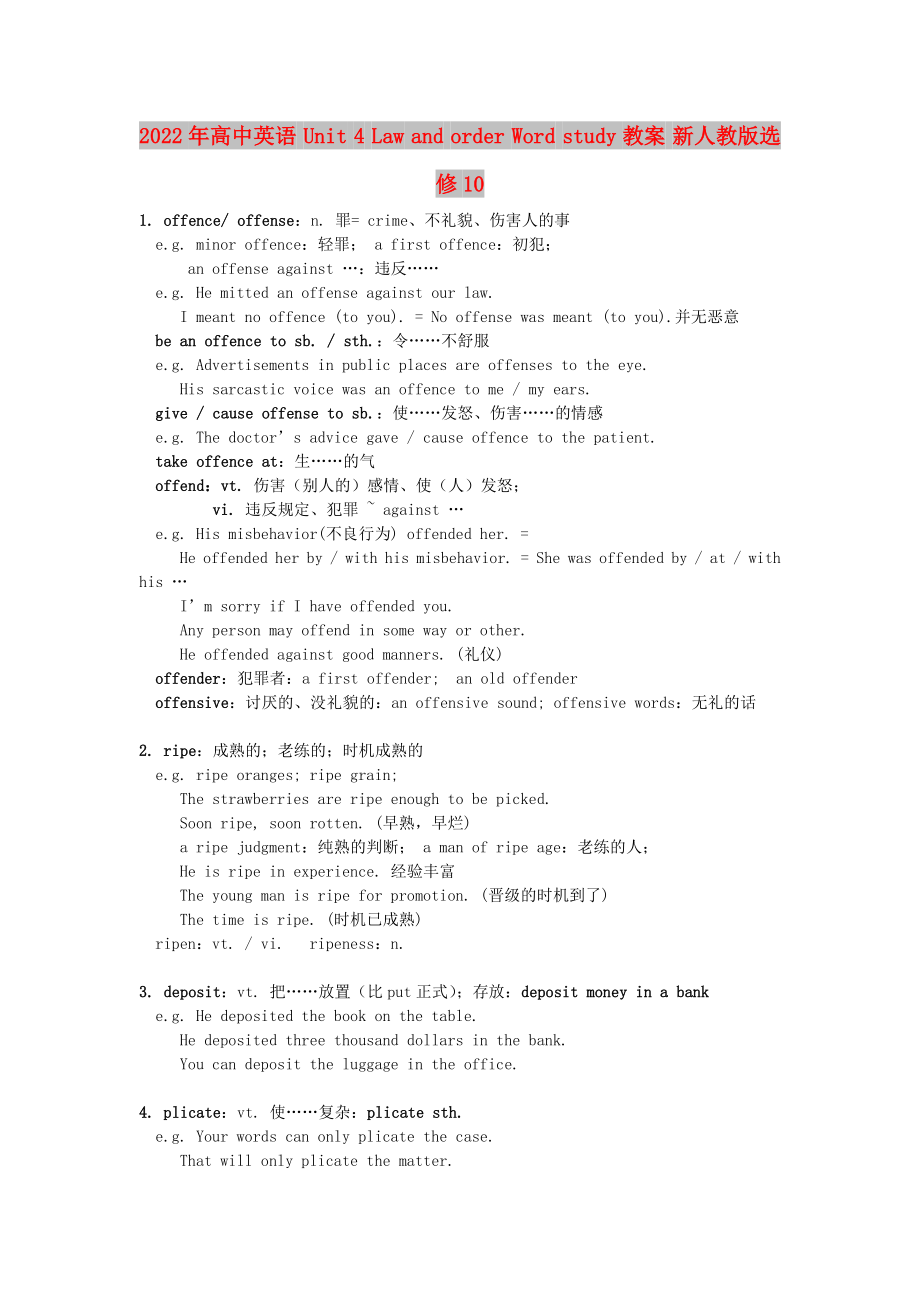《2022年高中英語(yǔ) Unit 4 Law and order Word study教案 新人教版選修10》由會(huì)員分享�����,可在線閱讀�,更多相關(guān)《2022年高中英語(yǔ) Unit 4 Law and order Word study教案 新人教版選修10(4頁(yè)珍藏版)》請(qǐng)?jiān)谘b配圖網(wǎng)上搜索。
1����、2022年高中英語(yǔ) Unit 4 Law and order Word study教案 新人教版選修10
1. offence/ offense:n. 罪= crime、不禮貌����、傷害人的事
e.g. minor offence:輕罪; a first offence:初犯����;
an offense against …:違反……
e.g. He mitted an offense against our law.
I meant no offence (to you). = No offense was meant (to you).并無(wú)惡意
be an offe
2、nce to sb. / sth.:令……不舒服
e.g. Advertisements in public places are offenses to the eye.
His sarcastic voice was an offence to me / my ears.
give / cause offense to sb.:使……發(fā)怒�����、傷害……的情感
e.g. The doctor’s advice gave / cause offence to the patient.
take offence at:生……的氣
offend:vt. 傷害(
3����、別人的)感情����、使(人)發(fā)怒�;
vi. 違反規(guī)定�����、犯罪 ~ against …
e.g. His misbehavior(不良行為) offended her. =
He offended her by / with his misbehavior. = She was offended by / at / with his …
I’m sorry if I have offended you.
Any person may offend in some way or other.
He offended against good mann
4�����、ers. (禮儀)
offender:犯罪者:a first offender; an old offender
offensive:討厭的�、沒(méi)禮貌的:an offensive sound; offensive words:無(wú)禮的話
2. ripe:成熟的;老練的�����;時(shí)機(jī)成熟的
e.g. ripe oranges; ripe grain;
The strawberries are ripe enough to be picked.
Soon ripe, soon rotten. (早熟����,早爛)
a ripe judgment:純熟的
5、判斷�; a man of ripe age:老練的人��;
He is ripe in experience. 經(jīng)驗(yàn)豐富
The young man is ripe for promotion. (晉級(jí)的時(shí)機(jī)到了)
The time is ripe. (時(shí)機(jī)已成熟)
ripen:vt. / vi. ripeness:n.
3. deposit:vt. 把……放置(比put正式)����;存放:deposit money in a bank
e.g. He deposited the book on the table.
He dep
6���、osited three thousand dollars in the bank.
You can deposit the luggage in the office.
4. plicate:vt. 使……復(fù)雜:plicate sth.
e.g. Your words can only plicate the case.
That will only plicate the matter.
Don’t plicate the problem by raising new suggestion.
plicated:復(fù)雜的���、難懂的:a pli
7、cated problem
plication:復(fù)雜化�,復(fù)雜性
5. keep up with sb.:跟上、不落后�;保持聯(lián)系
e.g. Would you please walk slowly? I can’t keep up (with you).
Keep up with the fashion. (跟上時(shí)尚)
Do you still keep up with your old classmates?
keep up:保持、繼續(xù)���; 不泄氣�����、保持高昂
e.g. I hope the fine weather will keep up.
8�����、
Their spirit are keeping up though they have much trouble.
The rain has kept up for three days and the roads are flooded.
We have kept up our friendship for twenty years.
The good news keeps up our spirits.
6. incite:煽動(dòng)�����、唆使:incite sb. to do sth.
e.g. These words incited
9�����、 the people to do further damage to the factory.
The colours incited the boy’s curiosity.
She incited her son to make greater efforts.
incitement:刺激物�����、煽動(dòng)物
7. view:n. 眺望����、一看���;
e.g. The temple is worth our view.
This is my first view of Mt. Ali.
視野:e into view:看得見(jiàn)����;o
10�、ut of view:看不見(jiàn);in view:看得見(jiàn)
眺望����、風(fēng)景���、景色:
e.g. This room has a fine view of the mountains.
The view from the top of the hill is wonderful.
想法、看法�����、觀點(diǎn)
e.g. What’s your view on the subject?
In my view, the present situation is quite good.
8. spy:n. 間諜���、情報(bào)員
vi. 監(jiān)
11��、視���、偵查:spy on / upon sb. / sth.
e.g. The police have been spying on the movements of the criminals.
He is paid by the police to spy on illegal trade.
spy into sth.:探聽(tīng)
e.g. Why do you spy into our affairs?
9. define:vt. 給……下定義、定……:define sth. (as ….)
e.g. It’s hard to defin
12�、e the word.
How does the dictionary define the word ‘triangle’?
The second paragraph is used to define the word ‘isolate’.
劃定……的界限
e.g. This river defines a border between the two countries.
My duties are not well defined.
The powers of the courts are def
13、ined by law.
10. enforce:vt. 執(zhí)行���、強(qiáng)化�、加強(qiáng):enforce sth.
e.g. The police enforce the law.
Traffic rules should be strictly enforced.
He showed some statistics to enforce his argument.
enforce sth on / upon sb.:強(qiáng)制要求某人做到某事
e.g. She enforced silence on the visitors.
I enforce pl
14��、ete obedience on the students.
11. be faced with:面臨�、面對(duì)
e.g. You should keep calm when you are faced with trouble.
I was faced with a new problem.
We are faced with financial problems now.
Faced with danger, one should show wit and bravery.
face:vt. / vi. 面對(duì)、朝
e.g. M
15、y bedroom faces south.
The temple stands on top of the hill, facing east.
Look up and face your parents.
Face the facts, please!
We are now facing a serious situation.
‘face’ phrases:
face the music:(接受不愉快的后果)���; face to face / face-to-face
in one’s face:當(dāng)面
16�、 in face of
look sb. in the face lose (one’s) face:丟面子���、丟人
make a face pull a long face:板著面孔
save (one’s) face:保全面子 show one’s face:露臉
to one’s face:當(dāng)著……的臉
12. suck:吮吸:suck sth.
e.g. We usually suck milk through a straw.
I was so thirst that
17���、I suck the orange dry.
It’s a bad habit to suck your thumb.
13. further = farther:距離遠(yuǎn):go farther / further
further:adj. / adv. 進(jìn)一步、深遠(yuǎn):
e.g. think further, ask further questions
Please wait at home till further notice.
No further explanation was given.
The ho
18���、use is on the further side of the street.
vt. 推進(jìn)����、促進(jìn):further one’s study / further education
e.g. His support furthered my career.
go further:往前走����、往下說(shuō)��、繼續(xù)談
e.g. I don’t want to go any further.
14. apology:make an apology to sb. for sth.
apologize:vi. apologize to sb. for sth.
 2022年高中英語(yǔ) Unit 4 Law and order Word study教案 新人教版選修10
2022年高中英語(yǔ) Unit 4 Law and order Word study教案 新人教版選修10

